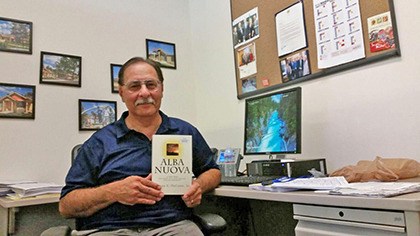Perhaps it is too convenient, the shorthand that melds into one shapeless mass the individuals who came from throughout the world to the United States near the turn of the 20th century, seeking a better life.
In his first book, “Alba Nuova,” (A New Dawn) one local author separates from the huddled masses one of the flesh-and-blood people who passed through Ellis Island and became a proud American citizen.
The book tells the story of Pasquale DaCorsi of Naples, italy, who, one morning in 1898, at 47 years of age, kissed his wife, Rafelia, and their young sons, Eduardo, Arthur and Francesco, goodbye – they would join him later – boarded the SS Aller and left his native land forever.
Who, packed in steerage with 1,100 mostly unwashed bodies in conditions dank and dim, rank and ripe, sailed across the Atlantic Ocean in 12 days.
And it warms us with the good life he subsequently made for his family, and of generations of Americans then unborn that would spring from his first step onto American soil.
Writing old Pasquale’s story is the realization of a dream long cherished by his great-great grandson, the book’s author, Auburn City Councilman Claude DaCorsi.
“I always wanted to write a book about my family,” DaCorsi said. “I made some notes one night and was going through some things, when I told my wife, ‘I have so little information about my great-great grandfather. I know he was a glove cutter, I have information from what I have researched online, but I don’t have a whole lot about him because he passed away years before I was born.'”
Although DaCorsi had never met or seen Pasquale, who died in 1932, like all families, his told stories, and young Claude’s ears were eager.
Stories that told how Pasquale — whom friends soon called Charles — settled himself and his family in Gloversville, N.Y., the center of glovemaking in the United States at that time, where he continued his trade. By the winter of his age, he was a highly respected teacher of the art and a beloved figure in the community.
From having seen the hands of his glovemaker uncles in Gloversville, DaCorsi had a very good idea of what the old man’s hands would have looked like – stained with dye, gnarled and crippled, practically useless after a lifetime of stretching leather hides and cutting them with shears.
He knew as well that Pasquale was a short man.
And a devoted Catholic.
“And everyone who knew him said he was an extraordinarily kind and compassionate man,” DaCorsi said.
With that, DaCorsi began his research, pursued Pasquale into the yellowed pages of registries and immigration documents. From his efforts he collected several pages of vital notes.
While DaCorsi changed some names to protect the privacy of people who are still living, all names reflect people who actually existed.
As for the dialogue and thoughts of long dead people, of course DaCorsi had to recreate that.
But knowing his family, and the emotional nature of Italians of that generation, DaCorsi insists he has a pretty good idea how the old man would have reacted to given situations.
For instance, he asked himself, what would Pasquale have said at that first sight of the Statue of Liberty in New York Harbor?
“‘Sono arrivato (I have arrived): the story of an Italian Immigrant.’ That’s the title I put on here first,” Claude said. patting his book. “But another crucial thing I knew about him was that he belonged to the Alba Nuova Lodge in Gloversville.”
What DaCorsi, who has been a member of the Auburn Sons of Italy Lodge since 2002, wanted to know was whether Alba Nuova had first been a Sons of Italy Lodge. So, he e-mailed the Supreme Sons of Italy Lodge back East.
In a couple of weeks came the answer — and a trove of information.
“I learned that Alba Nouva Lodge 387 was founded in Gloversville, New York in 1915. In the book I already have the lodge existing well before 1915. In fact, I have it transitioning from a Sons of Italy lodge. But it could have happened that way. There were a lot of social clubs in New York in 1915, and the Sons Italy NYC was founded in 1905.”
If there is any one thing DaCorsi would like readers to take away from his book, he said, it is this:
“There is nothing more important than maintaining the strong bonds of family relationships, down the generations. I had it when I was growing up, and I am passing it down to my children, who are passing it down to their children now,” DaCorsi said.
“Alba Nuova” is available for $16 via Amazon.com.



